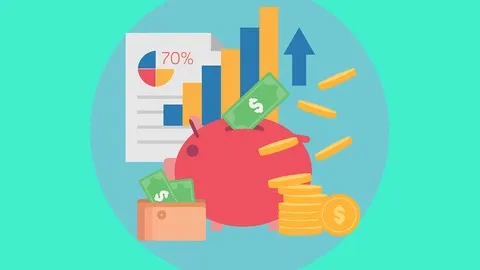
Balance Sheet Accounting Equation 
The balance sheet is a fundamental accounting tool that provides an overview of a company's assets, liabilities and equity. It is based on the accounting equation, which is composed of three components: assets, liabilities and equity. ▼
ADVERTISEMENT
Course Feature
![]() Cost:
Cost:
Free
![]() Provider:
Provider:
Udemy
![]() Certificate:
Certificate:
No Information
![]() Language:
Language:
English
Course Overview
❗The content presented here is sourced directly from Udemy platform. For comprehensive course details, including enrollment information, simply click on the 'Go to class' link on our website.
Updated in [March 06th, 2023]
This course provides an overview of the balance sheet accounting equation. It is designed to help students gain a comprehensive understanding of the balance sheet and its components.
The course begins by introducing the concept of the balance sheet and its purpose. It then explains the components of the balance sheet, including assets, liabilities, and equity. It also covers the different types of assets and liabilities, such as current assets, long-term assets, current liabilities, and long-term liabilities.
The course then explains the accounting equation and how it is used to calculate the balance sheet. It also covers the different types of transactions that affect the balance sheet, such as sales, purchases, and investments.
The course then explains the different methods of preparing a balance sheet, such as the direct and indirect methods. It also covers the different types of financial statements, such as the income statement, statement of cash flows, and statement of changes in equity.
Finally, the course covers the different types of ratios used to analyze the balance sheet, such as the current ratio, quick ratio, and debt-to-equity ratio. It also covers the different types of financial analysis, such as trend analysis, ratio analysis, and common-size analysis.
At the end of the course, students will have a comprehensive understanding of the balance sheet and its components. They will be able to use the accounting equation to calculate the balance sheet and analyze the financial statements. They will also be able to use the different types of ratios and financial analysis to assess the financial health of a company.
[Applications]
The application of this course is to help students gain a better understanding of the balance sheet accounting equation. After completing this course, students should be able to identify the components of the balance sheet, understand the relationship between assets, liabilities, and equity, and be able to calculate the accounting equation. Additionally, students should be able to analyze the financial position of a company by using the balance sheet. Finally, students should be able to use the balance sheet to make informed decisions about the financial health of a company.
[Career Paths]
1. Financial Analyst: Financial analysts are responsible for analyzing financial data and providing advice to businesses and individuals on how to best manage their finances. They must be able to interpret financial statements, analyze trends, and make recommendations. Financial analysts are in high demand due to the increasing complexity of the global economy and the need for more sophisticated financial analysis.
2. Financial Controller: Financial controllers are responsible for overseeing the financial operations of a company. They must be able to analyze financial data, create financial reports, and develop strategies to improve the financial performance of the company. Financial controllers are in high demand due to the increasing complexity of the global economy and the need for more sophisticated financial management.
3. Investment Banker: Investment bankers are responsible for helping companies and individuals raise capital and manage their investments. They must be able to analyze financial data, develop investment strategies, and provide advice on how to best manage investments. Investment bankers are in high demand due to the increasing complexity of the global economy and the need for more sophisticated financial advice.
4. Financial Planner: Financial planners are responsible for helping individuals and businesses plan for their financial future. They must be able to analyze financial data, develop financial plans, and provide advice on how to best manage finances. Financial planners are in high demand due to the increasing complexity of the global economy and the need for more sophisticated financial planning.
[Education Paths]
1. Bachelor of Science in Accounting: This degree program provides students with a comprehensive understanding of the principles of accounting, including the balance sheet equation. Students learn how to analyze financial statements, prepare financial reports, and use accounting software. Additionally, they gain an understanding of the legal and ethical aspects of accounting. This degree is becoming increasingly popular as businesses become more reliant on accurate financial information.
2. Master of Science in Accounting: This degree program provides students with an advanced understanding of the balance sheet equation and other accounting principles. Students learn how to analyze financial statements, prepare financial reports, and use accounting software. Additionally, they gain an understanding of the legal and ethical aspects of accounting. This degree is becoming increasingly popular as businesses become more reliant on accurate financial information.
3. Master of Business Administration in Accounting: This degree program provides students with an in-depth understanding of the balance sheet equation and other accounting principles. Students learn how to analyze financial statements, prepare financial reports, and use accounting software. Additionally, they gain an understanding of the legal and ethical aspects of accounting. This degree is becoming increasingly popular as businesses become more reliant on accurate financial information.
4. Doctor of Philosophy in Accounting: This degree program provides students with an advanced understanding of the balance sheet equation and other accounting principles. Students learn how to analyze financial statements, prepare financial reports, and use accounting software. Additionally, they gain an understanding of the legal and ethical aspects of accounting. This degree is becoming increasingly popular as businesses become more reliant on accurate financial information.
Course Syllabus
Income Statement
Overview of the Balance Sheet
Pros & Cons

Excellent

Great course explains things clearly

Good for beginner on accounting knowledge

Nice overview

Useful course

Very poor course

No explanation about how to prepare Balance Sheet

Lecturer needs to improve on the presentation

Fair enough
Course Provider

Provider Udemy's Stats at AZClass
Discussion and Reviews
0.0 (Based on 0 reviews)
Explore Similar Online Courses

Phase Diagrams

C Programming 2021: Master The Basics!

Python for Informatics: Exploring Information

Social Network Analysis

Introduction to Systematic Review and Meta-Analysis

The Analytics Edge

DCO042 - Python For Informatics

Causal Diagrams: Draw Your Assumptions Before Your Conclusions

Whole genome sequencing of bacterial genomes - tools and applications

Goods and Service Tax in India : A Brief Introduction

The Basics of Business Accounting

Cost Accounting and Artificial Intelligence Tools: Part 1
 Related Categories
Related Categories
 Popular Providers
Popular Providers
Quiz
 Submitted Sucessfully
Submitted Sucessfully
1. What is the accounting equation?
2. What is the purpose of the balance sheet?
3. What is the main difference between the balance sheet and the income statement?
4. What is the accounting equation for a balance sheet?
Correct Answer: Assets = Liabilities + Equity


Start your review of Balance Sheet Accounting Equation